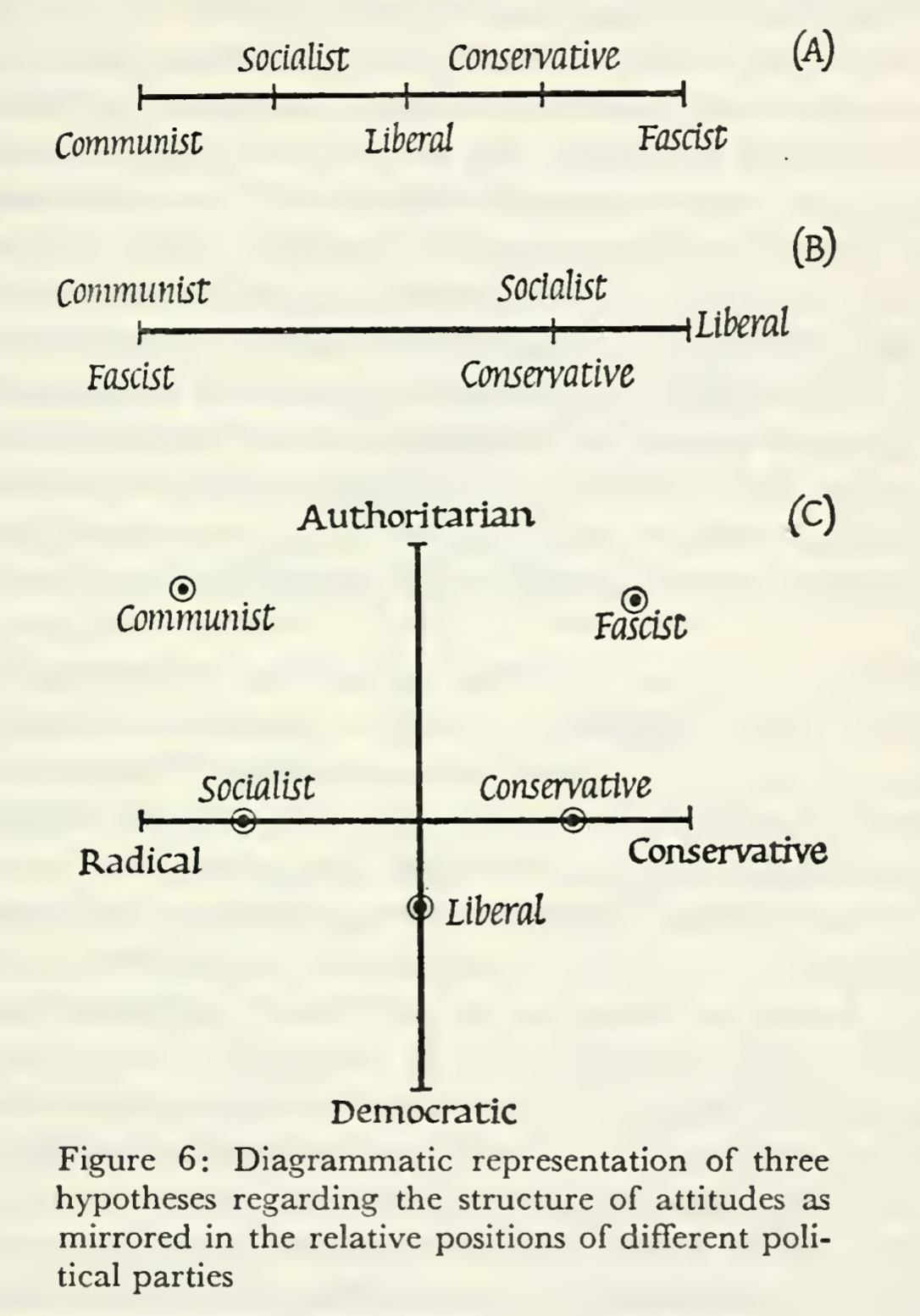Why are female intellectuals crazy?
Combining greater male variance with horseshoe theory
I have a speculative model of sex differences among people with extreme beliefs. Here I just mean extreme in the sense of statistically uncommon, say, being a full-blown libertarian, HBD enthusiast, traditional catholic in an atheist society etc. It goes like this:
Women are more centrist in their personality and thus their beliefs than men. They hold views that are more common, or statistically speaking, their standard deviation is smaller for beliefs and their strength of belief. This is just a special case of the nearly universal greater male variance finding.
To move a person to adopt views that are very unlike those held by the rest of society, some kind of psychological push-factor is needed. The main push-factors are intelligence, open-mindedness, or craziness (psychopathology, P factor).
Thus, statistically speaking, women with extreme views need a stronger push factor than men do to attain those views.
Thus, statistically speaking, women with extreme views will average higher open-mindedness, intelligence, and craziness.
I think the evidence for (1) indirectly is very strong. One could look at survey data and what researchers call extreme response style/bias (ERS). This is just the tendency to pick "Strongly agree" and "Strongly disagree" end points of scales (black-white thinking). There is a meta-analysis of ERS and demographics:
The problem here is that ERS also reflect being unsophisticated and lower intelligence (2/2 for women relative to men). Women actually have more variance in their responses, d = 0.09 d on ERS, which is also seen for the various race differences. E.g. Blacks 0.25 d more ERS, given the correlation of ERS with IQ of -0.26, this back-estimates to an IQ gap of 0.23 / 0.26 = 0.90 SD; for women 0.34 SD, not so far off! This way of testing the greater male variance in beliefs idea then is confounded with intelligence, but it points in the wrong direction. I am not deterred, however, because I know weirdo belief movements of all sorts are dominated by men. I take this is better evidence than the direct evidence from ERS. The ERS is based on single items, it's possible scales aggregated from items will show another pattern.
What about people with odd beliefs, are they also odd psychologically? I don't think there is a direct study of this, but I guess it could be studied using e.g. OKCupid. It has primitive measures of intelligence, mental health, and all sorts of weird questions. One can construct an overall weirdness score for a person in a variety of ways, and I'm sure men will be more varied, and that such weirdness will be predicted by mental health particularly well (negatively). With regards to politics and intelligence, there is this study:
Conservative economic attitudes have been theorized as symptoms of low cognitive ability. Studies suggest the opposite, linking more conservative views weakly to higher, not lower, cognitive ability, but with very large between-study variability. Here, we propose and replicate a new model linking cognitive ability not to liberal or conservative economics, but to economic extremism: How far individuals deviate from prevailing centrist views. Two large pre-registered studies in the UK (N = 700 & 700) and the British Cohort Study dataset (N = 11,563) replicated the predicted association of intelligence with economic deviance (β = 0.4 to 0.12). These findings were robust and expand the role of cognitive ability from tracking the economic consensus to influencing support for (relatively) extremist views. They suggest opportunities to understand the generation and mainstreaming of radical fringe social attitudes.
So we know intelligence is a push-factor for extremist economic views (towards Marxism, libertarianism etc.), as we would expect from membership rosters of such groups.
With regards to mental health, Hans Eysenck already came up with the horseshoe theory in the 1950s. Here's from his 1957 book Sense and Nonsense in Psychology:
And his empirical results based on a 60-item survey of British fascists and communists:
Fascists and communists were similar in their approach. Eysenck got this idea because he grew up in Nazi Germany as a (half-)Jew, escaped to England, only to be attacked also by the communists.
So he knew these people were vicious on both sides, and thought about why that might be so. This study is not really a measure of mental health though, just their approach to politics. Based on my experience with communists online, there are a lot of crazy ones. I don't have so much experience with fascists, but definitely some of them are nuts.
(3-4) are based on statistics, but maybe one could test them somehow. It should be possible to find data on women in e.g. the libertarian party and check their levels of mental health compared to men. Generally, my impression of the sex difference among HBD enthusiasts is that the women are more crazy, with the smaller exception of those who are merely there due to being attachments to the men. Due to assortative mating, they are also above average, but less markedly so than those who are there on their own. I don't have any real survey data. There are quite few such women to begin with so they are hard to study systematically. Most of the male HBDers are just autists who looked hard at some data others don't look at. This meme, but unironically.







This is my intuitive sense of things...
Women, especially intelligent women, put a lot of weight on what high status individuals do and say. In the vast majority of times and places, this has served them well. Because of the malignant and dysgenic ideology that we call "wokeness", this is *not* the case in the America of the last 10 years.
"I am following and repeating what all the good high status people say. Why is this not working out for me? Why is it not improving my love life? Why is it not making me feel more happy and satisfied?"
It's a totally reasonable reaction. And struggling to find good emotionally-acceptable answers is what's gradually driving some of them crazy.
There are people who report on the news regularly. They wear nice suits, they are immaculately groomed, they are unfailingly civil, they convey a sense of considerable personal success. They strongly and consistently promote a long list of progressive values that the low-status deplorables call "wokeness". Thus wokeness is good! I should try to be as woke as possible. This way of thinking does make a certain degree of sense, but it fails when successful public figures start promoting bad ideas.
Some men also think like this, but most don't. Most men set specific personal goals/desires for their lives, and try to figure out how best to achieve those *specific* goals/desires. For most men, this comes down to finding a girlfriend/wife, having a nice job or career, having good entertainment, simply enjoying life and/or finding a sense of purpose in life. The failure mode for men is over-indulging in things that are enjoyable in the moment but cause long-term problems. But they're not going to buy into an ideology that is clearly counter to their basic self-interest just because the people promoting that ideology are high-status. Men put *some* value in high-status, but not *that* much.
So ultimately, the main fault is with the terrible ideology that has taken over much of the west, causing many otherwise smart people to make bad decisions. Until our societal elites fully dismiss this ideology, it will be very hard/unlikely for things to improve.
I think the intelligence effect on extremism is something that kind of has to be true if youre looking at high enough levels of extremism. To get *really* high extremism scores, you have to answer a lot of questions "correctly" from the POV of that ideology, and even extreme moods just cannot be this consistent without abstract aids.
Lower-intelligence people may be more likely to be "radical centrists", taking extreme positions in ways that *arent* consistent across questions - that seems to be what ERS is measuring.
Also, the ideological scales we judge extremism on are themselves based on abstract machinery. I think you could find political-question-aggregates on which stupid people are more extreme in either direction when looking at the whole population correlation (and I would like to see what those are), but still the *most* extreme on these scales would intelligent.